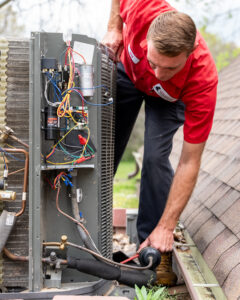![As energy costs continue to rise, many homeowners are looking for effective ways to save money on heating and cooling. Heating, ventilation, and air conditioning (HVAC) systems play a crucial role in maintaining comfortable indoor temperatures year-round, but they can also be significant contributors to high energy bills. By optimizing your HVAC system and adopting energy-efficient practices, you can reduce your energy consumption and save money. Here are some essential tips to help you shoot straight on your energy bills. 1. Regular HVAC Maintenance Routine maintenance is crucial for keeping your HVAC system running efficiently. Schedule professional HVAC inspections at least twice a year—once in the spring for your cooling system and once in the fall for your heating system. Regular maintenance helps identify and fix small issues before they turn into costly repairs, ensuring your system operates at peak efficiency. 2. Change Air Filters Regularly Clogged air filters force your HVAC system to work harder, increasing energy consumption and reducing its lifespan. Check your air filters monthly and replace them every 1-3 months, or as recommended by the manufacturer. Clean filters improve air quality and help your system run more efficiently. 3. Install a Programmable Thermostat A programmable thermostat allows you to set specific temperatures for different times of the day, ensuring your HVAC system isn't working harder than necessary when you're not home. By lowering the temperature when you're asleep or away, you can save up to 10% on your annual heating and cooling costs. 4. Seal and Insulate Your Home Proper insulation and sealing of your home prevent heat loss in the winter and keep cool air inside during the summer. Check for gaps and leaks around windows, doors, and ductwork, and use weatherstripping or caulk to seal them. Adding insulation to your attic, walls, and floors can also significantly reduce energy consumption. 5. Use Ceiling Fans Ceiling fans help circulate air, making your home feel cooler in the summer and warmer in the winter. In the summer, set your ceiling fans to rotate counterclockwise to create a cooling breeze. In the winter, reverse the direction to clockwise to push warm air down from the ceiling. Using ceiling fans in conjunction with your HVAC system allows you to set your thermostat a few degrees higher or lower, reducing energy use. 6. Upgrade to Energy-Efficient HVAC Equipment If your HVAC system is more than 10-15 years old, consider upgrading to a newer, energy-efficient model. Modern HVAC systems are designed to use less energy while providing better performance. Look for systems with high Seasonal Energy Efficiency Ratio (SEER) ratings for air conditioners and high Annual Fuel Utilization Efficiency (AFUE) ratings for furnaces. 7. Utilize Natural Ventilation Take advantage of natural ventilation by opening windows and doors during mild weather to let fresh air circulate. This reduces the need for your HVAC system to work, saving energy. Ensure your windows and doors are properly sealed when closed to prevent drafts. 8. Keep Vents and Registers Clear Blocked vents and registers can restrict airflow, making your HVAC system work harder and use more energy. Ensure furniture, curtains, and other objects are not obstructing your vents. Regularly vacuum and clean vents to remove dust and debris. 9. Use Window Treatments Window treatments, such as blinds, curtains, and shades, can help regulate indoor temperatures. During the summer, close blinds or curtains during the hottest part of the day to block out the sun's heat. In the winter, open them during the day to let in natural warmth and close them at night to retain heat. 10. Perform an Energy Audit An energy audit conducted by a professional can identify areas in your home where energy is being wasted. The auditor will assess your home's insulation, air leaks, and HVAC system efficiency, providing recommendations for improvements. Implementing these recommendations can lead to significant energy savings. 11. Optimize Your Thermostat Settings Set your thermostat to the highest temperature you're comfortable with in the summer and the lowest in the winter. According to the U.S. Department of Energy, setting your thermostat back 7-10 degrees for eight hours a day can save you up to 10% a year on heating and cooling. 12. Use Zoned Heating and Cooling Zoned heating and cooling systems allow you to control the temperature in different areas of your home independently. This means you can heat or cool only the rooms you're using, rather than the entire house, leading to significant energy savings. 13. Plant Trees and Shrubs Strategically planting trees and shrubs around your home can provide natural shade and reduce cooling costs in the summer. Deciduous trees, which lose their leaves in the winter, provide shade in the summer while allowing sunlight to warm your home in the winter. 14. Insulate Your Ductwork Leaky ducts can account for significant energy loss, making your HVAC system work harder to maintain desired temperatures. Ensure your ductwork is properly sealed and insulated, especially in unconditioned spaces like attics and basements. 15. Educate Your Family Educate your family members about the importance of energy conservation and how they can contribute. Simple actions, such as turning off lights, unplugging electronics when not in use, and closing doors and windows, can collectively make a big difference in your energy bills. Conclusion By implementing these energy-saving tips, you can reduce your heating and cooling costs while maintaining a comfortable home environment. Regular HVAC maintenance, proper insulation, and mindful thermostat settings are just a few of the strategies that can help you save money. Investing in energy-efficient equipment and making small changes in your daily habits can lead to significant long-term savings. Start shooting straight on your energy bills today and enjoy the benefits of a more efficient and cost-effective HVAC system. For more information on optimizing your HVAC system or to schedule a professional maintenance check, contact us at [Your Company Name]. Our experienced technicians are here to help you achieve maximum efficiency and savings.](https://jonwayneheatingandair.com/wp-content/uploads/2024/06/DSC05243-240x300.jpg)
Tips for Saving Money on Heating and Cooling: As energy costs continue to rise, many homeowners are looking for effective ways to save money on heating and cooling. Heating, ventilation, and air conditioning (HVAC) systems play a crucial role in maintaining comfortable indoor temperatures year-round, but they can also be significant contributors to high energy bills. By optimizing your HVAC system and adopting energy-efficient practices, you can reduce your energy consumption and save money. Here are some essential tips to help you shoot straight on your energy bills.
1. Regular HVAC Maintenance
Routine maintenance is crucial for keeping your HVAC system running efficiently. Schedule professional HVAC inspections at least twice a year—once in the spring for your cooling system and once in the fall for your heating system. Regular maintenance helps identify and fix small issues before they turn into costly repairs, ensuring your system operates at peak efficiency.
2. Change Air Filters Regularly
Clogged air filters force your HVAC system to work harder, increasing energy consumption and reducing its lifespan. Check your air filters monthly and replace them every 1-3 months, or as recommended by the manufacturer. Clean filters improve air quality and help your system run more efficiently.
3. Install a Programmable Thermostat
A programmable thermostat allows you to set specific temperatures for different times of the day, ensuring your HVAC system isn’t working harder than necessary when you’re not home. By lowering the temperature when you’re asleep or away, you can save up to 10% on your annual heating and cooling costs.
4. Seal and Insulate Your Home
Proper insulation and sealing of your home prevent heat loss in the winter and keep cool air inside during the summer. Check for gaps and leaks around windows, doors, and ductwork, and use weatherstripping or caulk to seal them. Adding insulation to your attic, walls, and floors can also significantly reduce energy consumption.
5. Use Ceiling Fans
Ceiling fans help circulate air, making your home feel cooler in the summer and warmer in the winter. In the summer, set your ceiling fans to rotate counterclockwise to create a cooling breeze. In the winter, reverse the direction to clockwise to push warm air down from the ceiling. Using ceiling fans in conjunction with your HVAC system allows you to set your thermostat a few degrees higher or lower, reducing energy use.
6. Upgrade to Energy-Efficient HVAC Equipment
If your HVAC system is more than 10-15 years old, consider upgrading to a newer, energy-efficient model. Modern HVAC systems are designed to use less energy while providing better performance. Look for systems with high Seasonal Energy Efficiency Ratio (SEER) ratings for air conditioners and high Annual Fuel Utilization Efficiency (AFUE) ratings for furnaces.
7. Utilize Natural Ventilation
Take advantage of natural ventilation by opening windows and doors during mild weather to let fresh air circulate. This reduces the need for your HVAC system to work, saving energy. Ensure your windows and doors are properly sealed when closed to prevent drafts.
8. Keep Vents and Registers Clear
Blocked vents and registers can restrict airflow, making your HVAC system work harder and use more energy. Ensure furniture, curtains, and other objects are not obstructing your vents. Regularly vacuum and clean vents to remove dust and debris.
9. Use Window Treatments
Window treatments, such as blinds, curtains, and shades, can help regulate indoor temperatures. During the summer, close blinds or curtains during the hottest part of the day to block out the sun’s heat. In the winter, open them during the day to let in natural warmth and close them at night to retain heat.
10. Perform an Energy Audit
An energy audit conducted by a professional can identify areas in your home where energy is being wasted. The auditor will assess your home’s insulation, air leaks, and HVAC system efficiency, providing recommendations for improvements. Implementing these recommendations can lead to significant energy savings.
11. Optimize Your Thermostat Settings
Set your thermostat to the highest temperature you’re comfortable with in the summer and the lowest in the winter. According to the U.S. Department of Energy, setting your thermostat back 7-10 degrees for eight hours a day can save you up to 10% a year on heating and cooling.
12. Use Zoned Heating and Cooling
Zoned heating and cooling systems allow you to control the temperature in different areas of your home independently. This means you can heat or cool only the rooms you’re using, rather than the entire house, leading to significant energy savings.
13. Plant Trees and Shrubs
Strategically planting trees and shrubs around your home can provide natural shade and reduce cooling costs in the summer. Deciduous trees, which lose their leaves in the winter, provide shade in the summer while allowing sunlight to warm your home in the winter.
14. Insulate Your Ductwork
Leaky ducts can account for significant energy loss, making your HVAC system work harder to maintain desired temperatures. Ensure your ductwork is properly sealed and insulated, especially in unconditioned spaces like attics and basements.
15. Educate Your Family
Educate your family members about the importance of energy conservation and how they can contribute. Simple actions, such as turning off lights, unplugging electronics when not in use, and closing doors and windows, can collectively make a big difference in your energy bills.
Conclusion
By implementing these energy-saving tips on saving money on heating and cooling, you can reduce your heating and cooling costs while maintaining a comfortable home environment. Regular HVAC maintenance, proper insulation, and mindful thermostat settings are just a few of the strategies that can help you save money. Investing in energy-efficient equipment and making small changes in your daily habits can lead to significant long-term savings. Start shooting straight on your energy bills today and enjoy the benefits of a more efficient and cost-effective HVAC system.
For more information on optimizing your HVAC system or to schedule a professional maintenance check, contact us. Our experienced technicians are here to help you achieve maximum efficiency and savings.

